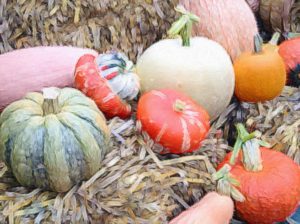I grew up on a bluff overlooking the Connecticut River. Looking out our front window gave us a view over the entire river valley, which on a clear day allowed us to see all the way to the Berkshires of Massachusetts. Behind our house was a large orchard, which rose even higher on our hill. It was planted mostly in apple trees, but also had peach and pear trees, and even pumpkins in the fall. For us kids, the orchard was a place to hike and hide; and in the winter, we skied, pulled behind my sister’s good-natured quarter horse.
 The orchard was also a place for us to mark the seasons. The scented apple blossoms of spring always gave way to ripening fruit in the fall. Many of the apples ended up a half-mile down the road at the local cider mill, where they were quickly converted into fresh, tart cider. As an adult, when summer starts to wind down, and fall is in the air, my mind always goes back to apples and cider and the uphill walk to the top of the orchard.
The orchard was also a place for us to mark the seasons. The scented apple blossoms of spring always gave way to ripening fruit in the fall. Many of the apples ended up a half-mile down the road at the local cider mill, where they were quickly converted into fresh, tart cider. As an adult, when summer starts to wind down, and fall is in the air, my mind always goes back to apples and cider and the uphill walk to the top of the orchard.
As a practitioner of Chinese medicine, fall also takes on another meaning, which is what we should be eating now and why. The foods that are part of the fall harvest are those that are heartier than the vegetables of summer, because our seasonal task is to build up our energy for the coming winter. So what should we eat? Here is a list of some of the best choices from the fall harvest:*
1) Apples! From the Macintosh of my childhood to the Honey Crisps of my adopted home, apples are considered to be sweet and cooling in Chinese medicine. In addition, they are moistening, especially to your lungs, which is perfect as the air dries out during the fall and winter months.
2) Pumpkins and winter squash are sweet, warm in nature, and builds up your qi. They lend a heartiness to fall and winter meals that you don’t get from summer squashes, like cucumber and zucchini. If you have a hard time discerning which is which, remember winter squash varieties tend to have a very thick outer rind, but you can usually just peel a summer squash.
3) Pears. Considered to be sweet and sour and energetically cooling, pears moisten dryness like apples. They also clear heat and transform phlegm—so think about adding some pears to your diet it you have a fall cold.
4) Carrots are sweet and slightly warm. They boost your Spleen Qi and are good for your digestion.
5) Grapes, like pears are sweet and sour. They build Qi, nourish blood and strengthen ligaments, tendons, and bones.
6) Onions are considered to be pungent (kind of like spicy) and warm. They warm your core, move Qi, and are good for common colds.
7) Garlic is hot and pungent. Its concentrated flavor makes it a delicious and warming addition to stews, soups, and stir fried dishes.
8) Potatoes, sweet potatoes, and yams are all considered to be neutral in temperature and sweet. Their heartiness is good for building up Qi and nourishing Yin.
9) Swiss Chard is a green leafy vegetable that is sweet and grows throughout the fall until the first hard frost. Like most greens, Swiss chard is considered to be good for nourishing your blood. Use it in salads, soups, and sautéed dishes.
Remember that your seasonal task is to build up your energy reserves to survive and thrive during the coming winter. Check out your local farmer’s market or farm stand. The hearty foods that are part of the fall harvest are Mother Nature’s way of helping you do that.
*For more on the terms used in this post and Chinese medicine in general, check out Simple Steps: The Chinese Way to Better Health. For more information of the specific properties of food, take a look at Helping Ourselves: A Guide to Traditional Chinese Food Energetics.



